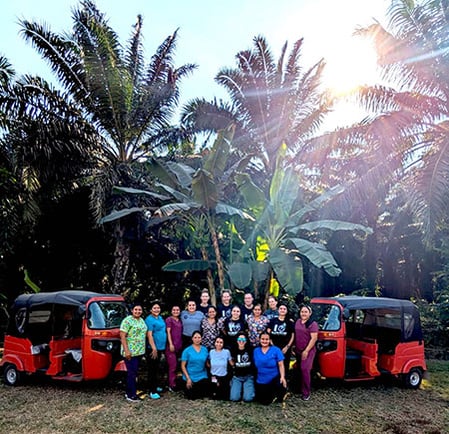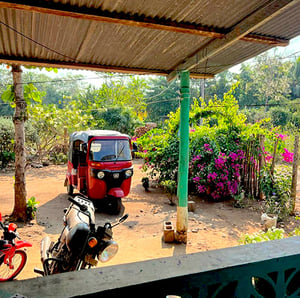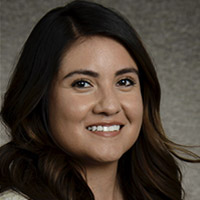What did you do in Guatemala?

CU Nursing students and Trifinio Clinic staff
|
We landed in Guatemala City (Guatemala’s capital) and then traveled about four hours to the Trifinio Clinic. Once we were there, we were connected with nurses in the community. We were paired up with them and went into different homes in the community to provide care. That care can range from prenatal care, early childhood health and development, and other well-being services relating to community outreach.
We also collaborated with other healthcare professionals including Dr. Anthony Bolaños, nutritionists, and researchers to learn what can be done to promote better healthcare and well-being. It was a great experience to see and be in that space – and to be welcomed – because being welcomed into a different culture is so important.
Describe what it was like being paired with one of the clinics’ nurses.
Each student was paired with a team of nurses, so it was either two students and two nurses together, or one student and two nurses together. Each day, we went with a different team of nurses because everyone had their own style of providing care (even though they were providing the same type of care), so different skills and styles were shared between all the students. We also provided a lot of basic care, like weighing babies, taking vital signs, and reinforcing general healthcare knowledge to the community. We saw anywhere from two to five patients per day.
How was it being immersed in the community and jumping right in to provide care?

Rural roads, motorbikes, and carts are a part of the Guatemala community
|
We had a meeting on campus a few weeks before we left so we would know what to expect. It was so helpful because Guatemala is so different than the US. It is one thing to be told about the country, but it’s another thing to experience it, so it was very eye-opening. We had discussions in our group and had time to reflect on what the realities are in Guatemala, like barriers preventing access to care.
Was it hard to communicate nursing terms and words in Spanish? (There is a Spanish requirement for students who go on the trip)
All of the nurses we worked with spoke Spanish. We also had a translator to help. I speak Spanish, but there are some medical terms I’m not used to, and there are medical terms patients aren’t used to, so it’s very similar to English medical terms English speakers don’t know. But most of my Spanish-speaking skills in Guatemala were really trying to connect with patients, connecting with nurses, and connecting to the team there, because that’s where trust is built.
Explain some of the nursing skills you learned that will help you in your career.
Trust is a major component because many times when I saw a patient, they weren’t sure if they could come back to get care, so I wanted to make sure they understood what service was being offered and why this care matters. I also learned how to fully observe the healthcare setting I’m in so I can gather more data and information, which allows me to know what kind of care I can provide.
All of this will help me in my career because in the US, we all come from different backgrounds, cultures, and values. We want to make sure there’s trust in the healthcare team providing care so we can have good outcomes.
How will this experience help you become a better nurse?
I want to know the community I’m serving, whether I’m going to be a community health nurse or not. So, it’s important to know what kind of challenges patients are facing when it comes to accessing care. Is there access to transportation to and from the clinic? What kind of learning style is there? I want to know these things so I can have a better rapport with my patients, allowing me to provide better care. These things will determine whether a patient can – or will – continue to receive care.
What’s one difference you noticed between healthcare in Guatemala compared to care in the US?
One thing I noticed was that in Guatemala, nurses are immersed within the community so there’s trust that’s already built. Patients can walk into the clinic, so nurses can refer them for other treatment. Nurses are also very resourceful there, and they advocate for their patients, which is similar to nurses here in the US.
Why is it so important for CU Nursing to offer this experience, and why should students consider going to Guatemala?
Want to Learn More About Guatemala?
|
|
Join us for a Professional Development Series!
When: May 16, at Noon
Where: Room 1303, Ed2North
What: CU Nursing students will give presentations on their clinical immersion experience
|
This experience was so beneficial because you’re able to see patients, gather data, and provide care. I feel like cultural values are just as important, and being able to provide that cultural respect is critical. If students have the opportunity and have the ability, they should be encouraged to go. Traveling to another country is so different, and you can immerse yourself in an experience like this so you’re able to connect and collaborate with nurses from another country. You’re able to see the work they do, and then bring that knowledge back to Colorado.
What is your favorite – or most memorable – part of the experience?
The whole experience was so memorable – it’s hard to pick. I think one thing was being able to get out into the community with nurses there and connect with them and the patients we were serving. We were able to connect with nurses and patients on another level and learn about the culture, education system, politics, and their personal lives. Going out into the community really affirms where I want to be and the work I want to do as a nurse.







